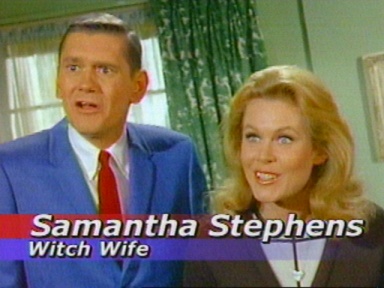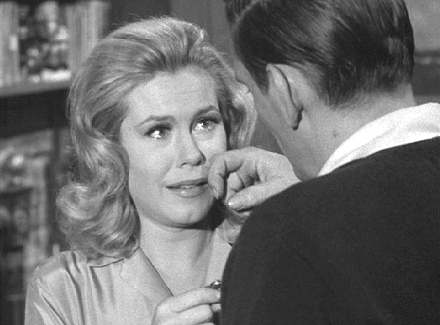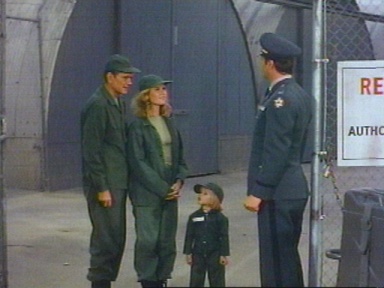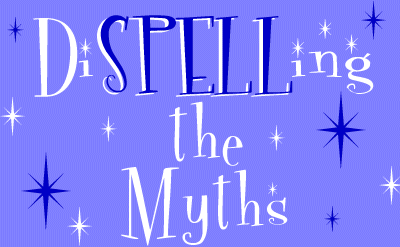| By
Arfies
 "It's Sexist!"
"It's Sexist!"
Why would Samantha, an all-powerful witch who could have almost
anything she desired with just a twitch of her nose, choose to marry
a man who forbade her to use her natural powers of witchcraft? That
is a (good) question, which Endora brought up constantly. This is
seen in # 91, Sam in the Moon:
"I can't see where I went wrong. I brought you up as a proper witch,
taught you all the best incantations, and here you are, married to
a mortal, doing the most menial tasks–a fallen woman."
And yet, Samantha was still content with being a then"typical
housewife drudge." A satirical spin on '60s suburbia. The other witches
and warlocks of the show thought this way of life was ridiculous-
which was all right, since "mere mortals" judged the jet-set lives
of the empowered to be pretty ridiculous themselves.

Endora always mocked "Durwood" about his existence and that mortal's
desire to earn things by working for them- the "hard way." But when
he received those things, it would just mean much more than it would
have otherwise. Samantha recognized that. Emotional fulfillment was
one of those things that couldn't simply be "zapped up." But it was
something that she wanted badly enough to sacrifice her heritage for.
Even in the pilot episode, it's shown that Sam was the one who first
made the choice not to use witchcraft in her marriage. Darrin didn't
force it on his wife to begin with, but why did he agree with her
on the decision and end up, at times, yelling, "I forbid you to use
witchcraft in this house!"?
Possible reasons:
1. It scared him out of his wits. Who wouldn't be terrified of a spouse
who could turn you into an artichoke if you even slightly annoyed
them? If they had the power to make the world as you know it turn
upside-down (literally)? Add this to the fact that Samantha didn't
even tell Darrin that she was a witch until after they married–a
huge part of her life kept secret from him, letting her future husband
think that he knew all about the woman he was going to marry. Finding
out this was not the case would be a shock to anyone.
2. Male ego. Perhaps Darrin viewed his wife's unlimited power as a
threat to his masculinity and position as Head of Household in the
pre-Women's Lib 1960s–and felt bad about it. Darrin says this
himself in "A is for Aardvark" (a great example, along with being
a great episode):
DARRIN: You know, I have been thinking. And I've come
to a conclusion: I've been selfish, stupid, and unreasonable.
And I want to ask your forgiveness.
SAM: I don't know what you're talking about.
DARRIN: Well, when we were married, you tried to fit your way
into my scheme of life.
SAM: I love you- I want you to be happy.
DARRIN: But what did I want? I wanted you to give up everything
that was natural to you- I said "No more witchcraft, give it up",
that's what I said. Isn't that what I said?
SAM: Yes. But I understand.
DARRIN: That's because you kept an open mind. But not me. No.
My mind was closed, just like a clamshell.
And:
DARRIN*: Why have I said to you, "No witchcraft! Don't help
me. Don't help yourself. Why? I ask you why. Well, I'll tell you
why: it was ego. If I couldn't do it, I didn't want you to do
it. If I couldn't give something to you, I didn't want you to
have it. Ego. Pure ego. Simple as that."
* This dialogue is cut from Hallmark's version.

3. He was afraid for Samantha's well-being. Especially with nosy
neighbor Gladys Kravitz always spying on the Stephens, convinced that
"There's something funny going on in that house, and I'm going to
find out what!" The what-if-the-authorities-DID-find-out dream sequences
of "Sam in the Moon" and "I Confess" showed the very real dangers
it would bring if that ever did happen. The very word "witch"
even today sparks feelings of fear and hatred in some people (see
the next topic :p). So much for "Love the sinner, but hate the sin"
(although Darrin did love Sam– no matter what).

The
Stephens Family Once the Secret is Revealed in #135
When Charlie Leach, P.I., does the spying in his episodes, Darrin
pleads Sam to not use witchcraft- until Samantha mentions that Leach
was around Tabitha and her carriage. The protective dad then changes
his tone completely, telling Sam if Charlie Leach ever came around
she and Tabitha again, do whatever would be necessary to keep the
spy away.
No matter "witch" way it's looked at, the decision of
"no witchcraft" was really more of a mutual agreement between the
two of them. If Bewitched actually was sexist, Darrin would
have forced his wife to zap up everything in the world for him, then
demand a divorce. (That didn't happen). Samantha never would have
questioned the mortal woman's strange role as Obedient Housewife.
(She questioned it.) When the couple had a fight, Samantha would never
have actually yelled at Darrin.(She did. *Gasp!*) And Endora would
never have presented the common-sense view of the whole situation,
known today as feminism. (Even if the witch mother's viewpoint involved
turning her daughter's husband into an artichoke.)
 "It Is the Work of SATAN! All Involved Must Suffer Eternal Damnation!!!"
"It Is the Work of SATAN! All Involved Must Suffer Eternal Damnation!!!"
Good Lord. (And that is meant wholeheartedly.)
Harry Potter, The Wizard of Oz, various fairy tales,
and yes, Bewitched, are among the entertainment entities sometimes
accused by conservative religious groups for "promoting Satanism."
Nothing could be further from the truth.
First of all, Samantha was NOT an evil witch. Her powers, when
used, were really for the greater good. Real witches, as in practitioners
of Wicca, believe this. Wicca is a nature-based religion, not even
believing in the Christian invention of "the devil", much less worshiping
him (despite what some ignorant conservatives may want to think) .
The Wiccan motto (with some variations on it) is as follows:
'An it harm none, do as ye will.' In other words, it is forbidden
to use witchcraft for evil purposes. For an in-depth look at the history
of witches, Wiccan or otherwise, click here.
Being a witch was not even a religion on the show, but a birthright.
And Samantha was definitely NOT against Christians or anyone else's
beliefs. In fact, in "Love is Blind", she was in a church for Kermit
and Gertrude's wedding. For more information on this topic of "diSPELLing"
and how the show certainly didn't "speak Satan's tongue," read the
chapter "This Witch for Hire, on Fire" in Herbie J. Pilato's book,
Bewitched Forever.
Ronald G. Lapp, in a Bewitched message board post, brought
up some VERY good points found in pages 155-156 of The Secret Life
of a Satanist by Blanche Barton. It's revealed that Anton LaVey,
founder of the Church of Satan, HATED Bewitched. Lapp's response:
If Bewitched was a recruiting poster for Satanism, wouldn't
Anton LaVey LOVE the show? After all, Satanism made him very rich,
and Bewitched, if it was pro-Satan, would have only made him richer.
Some closed-minded conservatives still don't care, despite all
of the points made, and always seem to quote the exact same Biblical
passage from Deuteronomy 18:10-12, with "occult" words bolded for
effect (not by the author of this essay.):
"There shall not be found among you anyone who . . . practices
witchcraft, or a soothsayer, or one who interprets omens, or a sorcerer,
or one who conjures spells, or a medium, or a spiritist, or one
who calls up the dead. For all who do these things are an abomination
to the Lord..."
They always, for some reason, seem to leave out the beginning
of Deuteronomy 18:10, which is:
"For example, any Israeli who presents his child to be burned
to death as a sacrifice to heathen gods must be killed."
So basically the Bible is saying to the Israelis, "don't practice
evil magic," which makes perfect sense. But when twisted and taken
out of context (as with any quote, from the Bible or otherwise) can
come to mean anything- even that a kind, loving, understanding woman
who has brought happiness to all must suddenly be condemned to Hell.
. . .just because she happens to be a [good] witch. Not because God
said so; but because people who are convinced that they alone are
right, that anyone who thinks differently than them, even in the slightest,
are wrong; are the ones who said that.
Some final words to this topic by the insightful Ronald G. Lapp,
talking about these closed-minded people, who are really missing out
on a great piece of classic Americana:
Their minds are made up. I know. I have been attacked by
the same group. I just ask them how many wars has Bewitched caused,
how many people have been tortured in the TV show's name, how many
children have been killed because of the show? If they're honest,
which most of them are not, the answer is none. Now I tell them
how many people were killed in their religion's name, how many wars
have been caused by their religion, etc. Usually you'll find that
the reason they hate Bewitched is because it promotes the strongest
faith of them all . . . . LOVE!
 "They Drink Too Much on That Show!"
"They Drink Too Much on That Show!"
It may seem that anywhere on Bewitched, there would be
either Larry Tate throwing back a martini or Darrin saying, "Make
it a double, Sam!" The amount of "alcohol" consumed on the show (it
wasn't actually real . . . most of the time. . . .) has driven some
parents to forbid their children from even watching the classic series.
There are no known cases, if any, of people who have become alcoholics
by watching Bewitched.
Many shows, movies, and books from years past featured social
drinking. It was an accepted part of life in that era. For example,
the author's grandpa was an executive in the 1960s, and "entertaining"
was serving drinks. A sign of the times.
Nowadays, out of "political correctedness", this custom is no
longer shown on television as much- in hopes of reducing the number
of youths driven to drink. In fact, the #1 cause of that is Influence
of Peers and Family–NOT television.
Drunkenness, whether Darrin, Larry, or, well, the Drunk has it,
is portrayed as not being too much fun. Not only do they look (and
feel) strange, but they also end up seeing some pretty weird things
(whether or not those things were real, they wouldn't know.) It could
always be blamed on the alcohol.
Promoting it? A-hah! A-hah! A-hah! A-hah. . . .nothing. Hiccup.
*Another interesting note: Americans drank the most during Prohibition.
 "What's With All the Dumb Cast Changes?"
"What's With All the Dumb Cast Changes?"
The show must go on, for whatever reason. The (in)famous "Darrin
Switch" is most remembered for completely changing the looks, attitude,
and actor of the male lead with no explanation. (It was all part of
an elaborate spell cast on the male descendants of Grover the Morph
by wood nymphs and- oh, never mind, just pop over to
Fan Fiction). But for the real reasons behind the changes in the
cast, here's a quickie guide:
Dick York (1964-1969) to Dick Sargent (1969-1972)
as Darrin Stephens
REASON: York suffered a back injury which left him with an
addiction to painkillers. It was a tough decision, but it was clear
that he couldn't work anymore without feeling immense pain.
Alice Pearce (1964-1966) to Sandra Gould
(1966-1971) as Gladys Kravitz
REASON: Pearce passed away from cancer in 1966. As for Gould
not appearing in 1972, it was because the Kravitzes were never seen
in the last season of the show.
Irene Vernon (1964-1966) to Kasey Rogers
(1966-1972) as Louise Tate
REASON: Vernon left to pursue a career in real estate.
Robert F. Simon (Beginning in 1964) to Roy
Roberts (Beginning in 1967) as Frank Stephens
REASON: If one actor wasn't available at the time, the studio
would use the other actor.
More cast changes with many different actors and actresses in
the same role (such as those for Darrin's secretary, Betty) happened
as well. Different sets of twins were employed to play the little
Stephens children, but it eventually settled down to Erin & Diane
Murphy (mostly Erin) as Tabitha Stephens and David & Greg Lawrence
as Adam Stephens.
No matter who was switched, it was always determined that each
role played was key to the series (therefore, shouldn't be done away
with). In that sense, Bewitched could really be viewed as two different,
yet similar, shows (Or four. . . or six . . . or eight. . .)
 "Every Episode has the Exact Same
Plot!"
"Every Episode has the Exact Same
Plot!"
Endora casts a spell on Darrin, mayhem ensues, and Samantha has
to explain that it was all part of a brilliant ad campaign. That's
all Bewitched is, right? Wrong! Here's a chart showing which episodes
did indeed have this "exact same plot":
| Season |
Total Eps. |
Eps. w/ This |
Percentage |
| 1 |
36 |
0 |
0 |
| 2 |
38 |
1-#43 |
2.6% |
| 3 |
33 |
0 |
0% |
| 4 |
33 |
2-#110 and #112 |
6.1% |
| 5 |
30 |
2- #146 and #153 |
6.7% |
| 6 |
29 |
3- #s 183, 187, and 199 |
10.3% |
| 7 |
28 |
3-#s 210, 220, and 227 |
10.7% |
| 8 |
26 |
0 |
0% |
| ALL |
254 |
11 |
4.3% |
A measly 4.3% of the episodes turn out to have the "exact same
plot"–a far cry from ALL of them!
If variations were to be put on this "formula", of course there
would be more episodes on the list, especially in the later years.
But think about it–EVERY SHOW ON THE AIR can be put into a "formula"
if it's generalized enough!
 "It's Another Typical Stupid '60s
Sitcom!"
"It's Another Typical Stupid '60s
Sitcom!"
WHAT?! Just because it started a fad of "weird" situation comedies
then? Bewitched easily raised above its competition (and imitators)
as a show of quality, sophistication, and endurance (It lasted longer
than any other show of its genre: for 8 years–that's long for
any sitcom!)
While other domestic comedies of its time had a perfect little
neighborhood, with perfect little people, who got into cute un-perfect
little predicaments, but resolved them all in a perfect little half-hour,
Bewitched didn't (although it was a half-hour). It put all
of this perfect little suburban TV world into a satire as looked at
by another culture- so different from our own, but alike in the way
they relate to each other. . . like real people. They're just unreal
by our standards, that's all.

The
Typical Suburban Morning on Morning Glory Circle
Years before TV sitcoms became "realistic", this series could
address issues such as prejudice, racism, wealth, finding true happiness,
and married couples who sleep in the same bed on TV (How scandalous!)
All of that was acceptable because Bewitched was, and still
is, after all, a fantasy–but one that can still spark controversy
(hence the need for this essay).
It still influences people today (though not submissive women,
Satanists, alcoholics, cynics, and so forth.)
And hey, remember this: It's 'just' a sitcom. Imagine that!
Bibliography
- All of you who have posted your thoughts on these
issues on the Harpies Bizarre message board. Thank you!
- Pilato, Herbie J. Bewitched Forever: The
Immortal Companion to Television's Most Magical Supernatural Situation
Comedy. 2nd edition. Irving, TX: Summit Publishing Group,
2001.
- Lapp, Ronald G. "Re: I'm not a Satanist." http://www.bewitched.net/wwwboard/1476.shtml
May 12, 1999. and "Re: I'm not a Satanist." http://www.bewitched.net/wwwboard/1521.shtml
May 19, 1999.
- "Which Witch is Which?" http://wintersteel.homestead.com/files/JamesArticles/Which_Witch_is_Which.htm.
|

